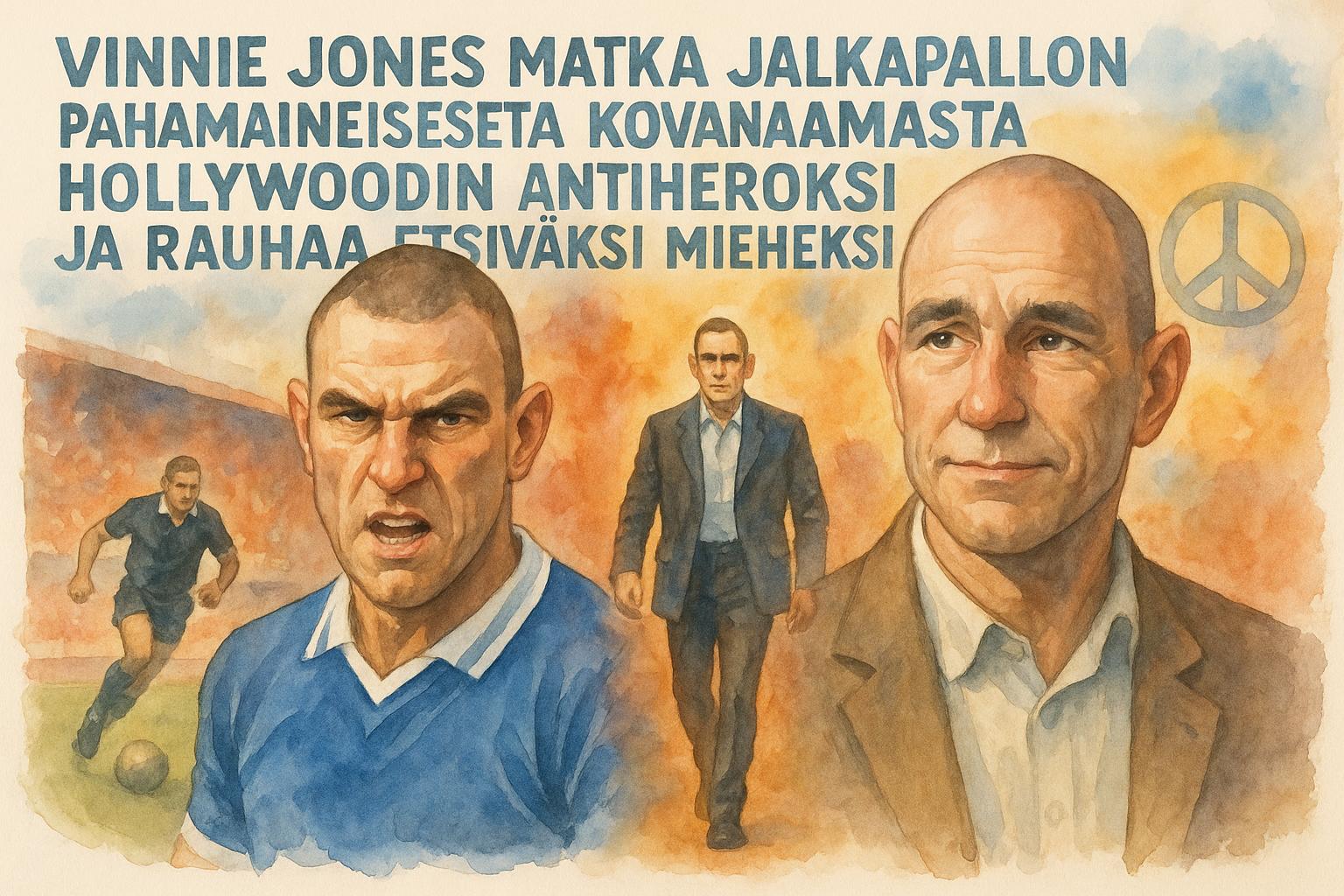Vinnie Jones matka jalkapallon pahamaineisesta kovanaamasta Hollywoodin antiheroksi ja rauhaa etsiväksi mieheksi
Some figures are impossible to forget. No matter how much time tries to blur their edges, they burn themselves into the collective memory. For British football in the 1980s, that figure was Vinnie Jones — a man who rarely felt like a player at all. He was a storm, a menace, a figure who seemed to thrive on chaos. On the pitch, he became headline and folklore. On the screen, he turned into myth and menace, a shadowy presence cast larger than life.
But behind the snarls and bloodshot history, who exactly is Vinnie Jones?
The Law of the Jungle: Wimbledon’s “Crazy Gang”
Think of today’s football: polished Instagram stars, rainbow-colored boots, carefully managed smiles. Now erase it. In Jones’s time, especially before the Premier League became global showbiz, football wasn’t a catwalk. It was bare-knuckle survival.
Nowhere was that truer than at Wimbledon, the club nicknamed the Crazy Gang. They weren’t graceful. They weren’t charming. They were a pack of wolves. The tactics were simple:
- Outfight
- Outmuscle
- Out-scare
And in the middle of that stood Jones, not pirouetting with skill but performing the work of a midfield executioner. He became folklore when Wimbledon shocked mighty Liverpool in the 1988 FA Cup Final, forever stamping his place as football’s enforcer-in-chief.
From Floodlights to Film Lights
Had Jones’s story ended with football, he would have lived forever as a cult hero to the game’s chaotic scrapbook. But fate had other plans. When Guy Ritchie cast him in Lock, Stock and Two Smoking Barrels, audiences weren’t seeing a footballer pretending — they were seeing living, breathing menace. His toughness was not scripted; it was lived.
Then came Snatch, and the creation of Bullet-Tooth Tony, embodying violence as if it were his everyday pulse. Jones became cinema’s antihero, a figure who wasn’t the spotlight’s center but who could not be ignored.
Demons in the Shadows
Off the pitch and off screen, chaos carried over. Jones was open about his battle with alcohol, calling it the “big dog inside me.” The once-glorified fury became a burden: courtroom appearances, tabloid scandals, flare-ups of violence.
And yet, in a turn as dramatic as his career, Jones gave it up. He chose stillness over storms, walking away from old habits and finding solace in quiet countryside instead of blaring stadiums or flashing film sets.
The Actor With Scars
Cinema gave Jones a second life, and he filled it with nearly a hundred roles: gangsters, guards, detectives, mutants. In X-Men: The Last Stand, he embodied Juggernaut, a perfect metaphor — unstoppable force rendered flesh on screen.
But then came something different. In 2020’s The Big Ugly, Jones portrayed Neelyn, a gangster torn apart by grief and weariness, violence stitched with sorrow. Unlike earlier roles, this performance felt tender, almost autobiographical — as if the armor had finally cracked to show the wounded man beneath.
Man or Myth?
So who is Vinnie Jones? On the pitch, he was feared, despised, yet strangely admired. On screen, he became Hollywood’s living blueprint for menace. But today, the man who once throttled opponents for dominance finds meaning in something quieter — the song of birds outside his West Sussex home.
Perhaps that is Jones’s ultimate lesson. Legends are never just legends. They are flesh and fracture, myth and man. And Vinnie Jones, once football’s outlaw and cinema’s brawler, now lives a slower story: one of scars, survival, and a search for peace.
In the end, his tale reads like an old saga — born of chaos, raised by rage, tempered by struggle, softened by time. Once football’s devil, later cinema’s monster, and now, simply a man rowing steadily toward calmer waters.
